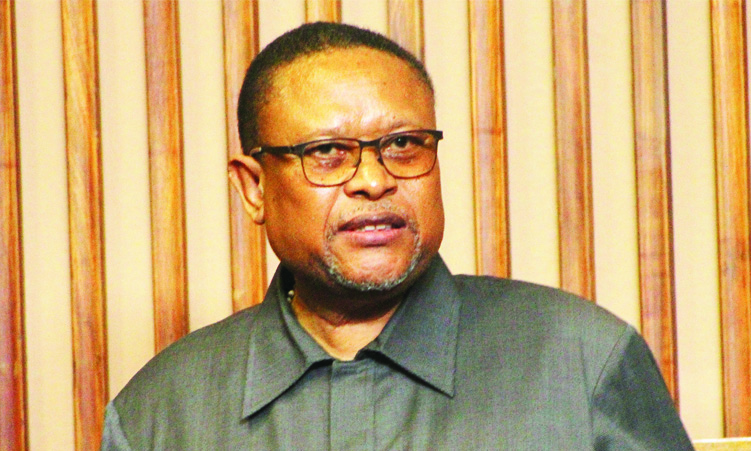Former fisheries and marine resources minister Bernhard Esau says he needs to get access to about N$3,5 million in his assets that have been placed under a Prevention of Organised Crime Act property restraint order, to pay his lawyers for past and future legal services.
Esau says this in a sworn statement filed at the Windhoek High Court in support of an application by him for funds to be released from his assets that are under a property restraint order.
Esau is asking the court to order that some N$1,2 million should be released from his restrained assets to pay the law firm Metcalfe Beukes Attorneys for past legal services, and that an amount of about N$2,3 million should also be released from his assets that have been placed under a restraint order, to pay the law firm to represent him during his pending trial in the Windhoek High Court.
Acting judge Beatrix de Jager heard oral arguments on Esau’s application, which is opposed by prosecutor general Martha Imalwa, yesterday.
De Jager postponed the delivery of her judgement on the application to 10 July at the end of the hearing.
Esau (66), who is one of the 10 individuals facing charges in the pending Fishrot trial in connection with the alleged corrupt use of Namibian fishing quotas, says in his affidavit he has an outstanding bill of about N$1,2 million for legal services provided by Metcalfe Beukes Attorneys.
In addition to that, defence lawyer Florian Beukes would require about 62 days to prepare for the Fishrot trial, and would charge about N$1,1 million – N$18 000 per day – for his trial preparations, Esau says in his affidavit.
He also says Beukes’ additional fees to represent him during 60 days of proceedings in the trial would amount to about N$1,1 million.
In a further sworn statement, filed at the court last month, Esau says he has not succeeded with attempts to obtain state-funded legal representation.
Attorney general Festus Mbandeka informed Beukes in a letter in February this year that he decided to decline a request for the Office of the Attorney General to provide legal representation to Esau, or for the state to pay for his legal representation during his trial.
Esau requested to be provided with legal representation by the government because he was a public official when the crimes he is accused of – including fraud, racketeering, money laundering and contraventions of the Anti-Corruption Act – were allegedly committed.
In his letter to Beukes, Mbandeka said Esau’s “alleged conduct would appear to represent a deviation from his official mandate and from his duty to act in the interest of the state at all times in the performance of that mandate”.
Mbandeka also stated: “The alleged conduct does not seem to have benefited the state in any manner, but instead to have furthered your client’s personal interests and/or of other persons other than the state.”
Mbandeka ended his letter by advising Beukes that Esau could apply to the Directorate of Legal Aid for legal representation.
However, the director of legal aid informed Esau in a letter in December last year that his application for legal aid had been unsuccessful, as his declared income was above the threshold as provided for in the Legal Aid Act.
ESAU’S ASSETS
According to Esau, his assets placed under a property restraint order include his Omaheke region farm, valued at about N$17,9 million, a house in the Hochland Park area of Windhoek that is valued at about N$3,8 million, five motor vehicles with a combined value of about N$840 000, livestock and six bank accounts with a combined credit balance of about N$3,6 million.
His liabilities include an amount of about N$1,2 million that he owes to Metcalfe Beukes Attorneys and a tax liability of about N$2,3 million, which he is disputing, Esau states in his affidavit.
Esau says his bank accounts include an account into which his monthly pension is being paid.
He also says the curators, under whose control the assets of some of the accused in the Fishrot case have been placed, have permitted his wife, Swamma Esau, to whom he is married in community of property, to operate that bank account to cover her living expenses and keep their farming operations going.
According to Imalwa, though, Esau’s pension payments – currently about N$79 570 per month – constitute “realisable property” that should be part of his assets under the restraint order.
Imalwa also says in an affidavit filed at the court that in her view the curators acted contrary to the property restraint order granted by a High Court judge in November 2020, when they gave Swamma Esau the authority to operate the bank account into which the former minister’s pension is being paid.
In terms of the Prevention of Organised Crime Act, the curators do not have the authority to allow household expenses to be paid from assets under their control, Imalwa says.
A person needs to apply to the court for household expenses to be covered from funds under a property restraint order, according to Imalwa.
She also says in her affidavit that more than N$1,6 million, which was not pension money and appears to have been from livestock sales, was paid into the bank account operated by Swamma Esau between August 2022 and the end of November last year.
Esau says in a replying affidavit that the curators are aware of all those transactions, and his wife has been giving monthly written reports on her income and expenses to the curators.
Beukes, assisted by Roberto Avila, represented Esau during the proceedings before De Jager.
The prosecutor general was represented by state advocate Mariette Boonzaier.
Stay informed with The Namibian – your source for credible journalism. Get in-depth reporting and opinions for
only N$85 a month. Invest in journalism, invest in democracy –
Subscribe Now!






